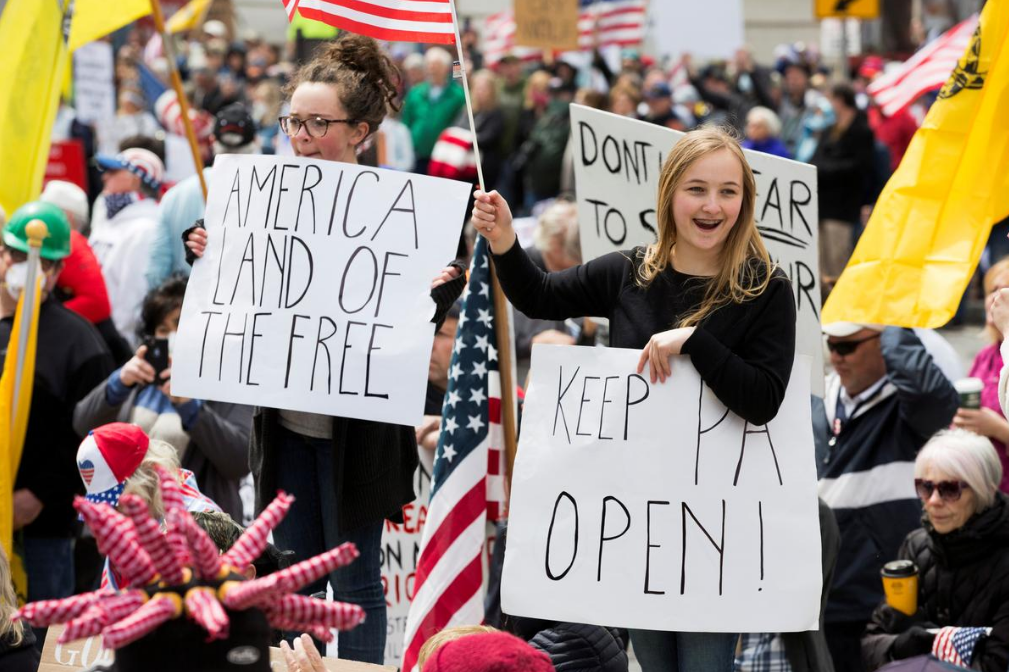U.S. President Donald Trump said on Monday he will be signing an executive order to temporarily suspend immigration into the United States amid the ongoing coronavirus outbreak.
"In light of the attack from the Invisible Enemy, as well as the need to protect the jobs of our GREAT American Citizens, I will be signing an Executive Order to temporarily suspend immigration into the United States," Trump said in a tweet late on Monday.
Trump had previously labeled the coronavirus as an "invisible enemy" during a news briefing at the White House in March.

Screenshot of Trump's tweet.
Screenshot of Trump's tweet.
The development came as the infection cases in the U.S. surpassed 774,000 with death toll topping 42,000 on Monday, far more than any other country in the world.
Trump said the move would also protect American jobs, although the state-imposed lockdowns to slow the virus have already left 22 million people in the U.S. out of work.
His tweet gave no further details about what the measure would entail, how it would be implemented or how long it would be in place, and according to The Washington Post, Trump could sign an executive order as soon as Tuesday.
Read more:
As protesters decry U.S. coronavirus lockdown, officials urge caution
Wall Street drops as oil traders cannot give away U.S. crude
The U.S. economy has ground to a standstill due to the coronavirus and more than 22 million people have applied for unemployment benefits in the last month.
Facing the raging spread of COVID-19 in the U.S., House Speaker Nancy Pelosi urged the president to "stop misrepresenting about the testing" when speaking to CNN's Anderson Cooper on Monday night.
"It's never too late to tell the truth. It's never too late to do the right thing," said Pelosi, criticizing the president for not admitting the United States had a problem with coronavirus testing capabilities.
Pelosi addressed the ongoing talks on a bill intended to help small businesses and hospitals hurt by the coronavirus pandemic, saying she felt optimistic that lawmakers would come to a conclusion tonight and the bill could be taken up in the Senate tomorrow and in the House on Wednesday.

Demonstrators gather to protest against the state's extended stay-at-home order to help slow the spread of COVID-19 in Harrisburg, Pennsylvania, U.S., April 20, 2020. /Reuters
Demonstrators gather to protest against the state's extended stay-at-home order to help slow the spread of COVID-19 in Harrisburg, Pennsylvania, U.S., April 20, 2020. /Reuters
'Bans come too late'
The president likely has the authority to restrict immigration to protect public health, Cato Institute researchers Alex Nowrasteh and Andrew C. Forrester said in a blog post.
"However, blanket bans like those imposed by the administration in recent months and those coming on April 21 are akin to closing the barn door after the horse has escaped," they wrote.
Trump has been widely criticized for initially downplaying the virus, which he likened to an ordinary flu and said was under control in the United States, before later accepting that it was a national emergency.
It was not immediately clear who would be affected by the latest immigration move as Washington has already suspended nearly all travel to the country.
The U.S. last month suspended all routine visa services around the world – including for immigrants – due to the coronavirus pandemic, and has also imposed a series of travel bans.
The latest move is also likely to affect those hoping to apply for permanent resident "green cards."
(Cover: U.S. President Donald Trump holds a campaign rally in Erie, Pennsylvania, U.S., October 10, 2018. /Reuters)
(With input from AFP)